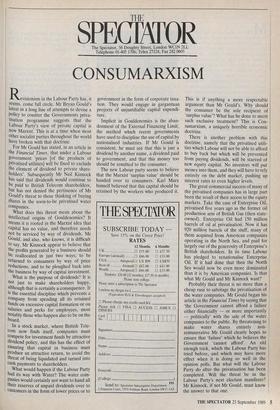'UHF
SPECTATOR
The Spectator, 56 Doughty Street, London WCIN 2LL Telephone 01-405 1706; Telex 27124; Fax 242 0603
CONSUMARXISM
Revisionism in the Labour Party has, it seems, come full circle. Mr Bryan Gould's latest in a long line of attempts to devise a Policy to counter the Governments priva- tisation programme suggests that the Labour Party's view of private capital is now Marxist. This is at a time when most Other socialist parties throughout the world have broken with that doctrine.
For Mr Gould has stated, in an article in the Financial Times, that under a Labour government 'prices [of the products of privatised utilities] will be fixed to exclude the element of dividend to private share- holders'. Subsequently Mr Neil Kinnock has said that dividends would continue to be paid to British Telecom shareholders, but has not denied the pertinence of Mr Gould's threat to those thinking of buying shares in the soon-to-be privatised water companies.
. What does this threat mean about the Intellectual origins of Gouldenomies? It means it is rooted in the Marxist idea that capital has no value, and therefore needs not be serviced by way of dividends. Mr Gould, and also, who knows, it is difficult to say, Mr Kinnock appear to believe that the profits generated by a business should be reallocated in just two ways; to be returned to consumers by way of price reductions, and to be ploughed back into the business by way of capital investment. What is the purpose of dividends? It is not just to make shareholders happy, although that is certainly a consequence. It Is the essential discipline which prevents a company from spending all its retained funds on excessive capital formation or on salaries and perks for employees, most notably those who happen also to be on the board.
In a stock market, where British Tele- com now finds itself, companies must compete for investment funds by attractive dividend policy, and this has the effect of ensuring that capital in business must produce an attractive return, to avoid the threat of being liquidated and turned into cash payments to shareholders.
What would happen if the Labour Party had its way with Water? The water com- panies would certainly not want to hand all their reserves of unpaid dividends over to customers in the form of lower prices or to government in the form of corporate taxa- tion. They would engage in gargantuan projects of unjustifiable capital expendi- ture.
Implicit in Gouldenomics is the aban- donment of the External Financing Limit, the method which recent governments have used to discipline the use of capital by nationalised industries. If Mr Gould is consistent, he must see that this is just a dividend by another name, a dividend paid to government, and that this money too should be remitted to the consumer.
The new Labour party seems to believe that the Marxist 'surplus value' should be handed over to consumers. Karl Marx himself believed that this capital should be retained by the workers who produced it. This is if anything a more respectable argument than Mr Gould's. Why should the consumer be the sole recipient of 'surplus value'? What has he done to merit such exclusive treatment? This is Con- sumarxism, a uniquely horrible economic doctrine.
There is another problem with this doctrine, namely that the privatised utili- ties which Labour will not be able to afford to buy back but which will be prevented from paying dividends, will be starved of new equity capital. No investors will put money into them, and they will have to rely entirely on the debt market, pushing up interest rates to even higher levels.
The great commercial success of many of the privatised companies has in large part been the result of their access to the equity markets. Take the case of Enterprise Oil, privatised five years ago as the former oil production arm of British Gas (then state- owned). Enterprise Oil had 150 million barrels of oil at privatisation. Now it has 920 million barrels of the stuff, many of them acquired from American companies operating in the North Sea, and paid for largely out of the generosity of Enterprise's British shareholders. In its time Labour has pledged to renationalise Enterprise Oil. If it had done that then the North Sea would now be even more dominated than it is by American companies. Is that what Mr Gould and Mr Kinnock want?
Probably their threat is no more than a cheap ruse to sabotage the privatisation of the water companies. Mr Gould began his article in the Financial Times by saying that 'the Government cannot afford a failure either financially — or more importantly — politically' with the sale of the water companies to the public. By threatening to make water shares entirely non- remunerative Mr Gould clearly hopes to ensure that 'failure' which he believes the Government 'cannot afford'. An old enough trick, which the Labour Party has tried before, and which may have more
effect when it is doing so well in the opinion polls. But what will the Labour Party do after the privatisation has been completed. Will the threat be in the Labour Party's next election manifesto? Mr Kinnock, if not Mr Gould, must know the answer to that one.


























































 Previous page
Previous page